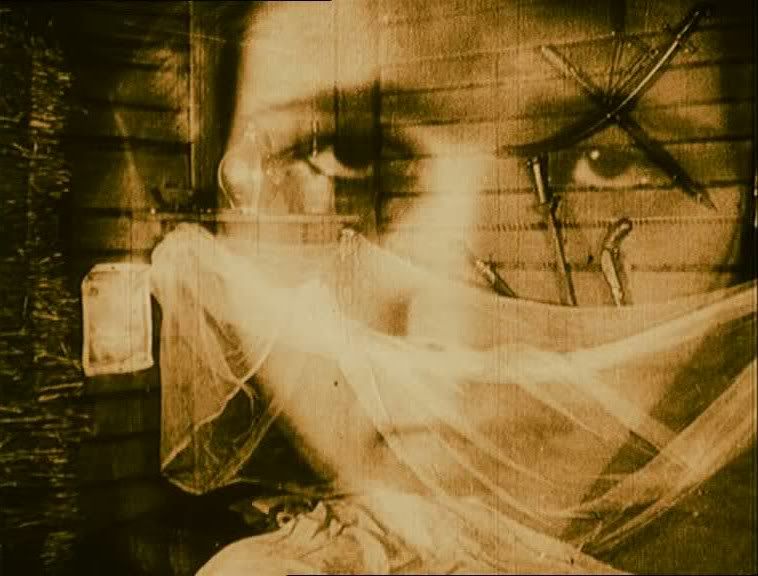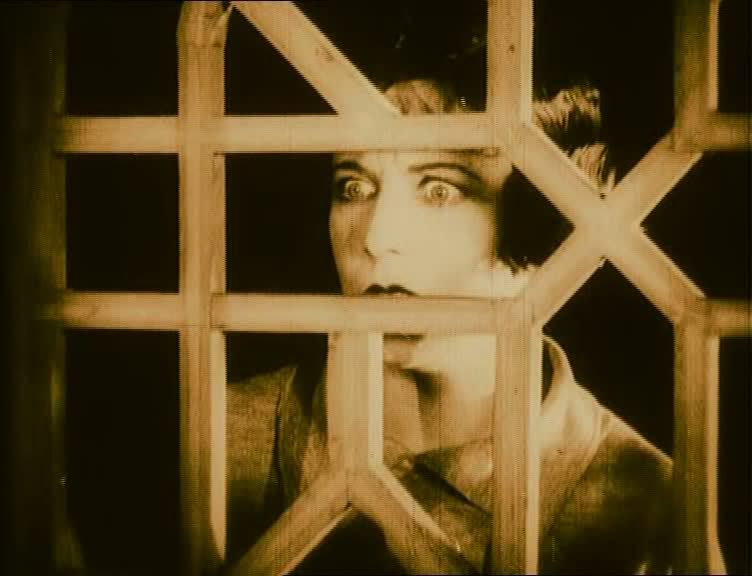 [This post is an early contribution to the third annual For the Love of Film blogathon and fundraiser, which will be officially running from May 13-18. This year, hosts Marilyn Ferdinand, Farran Smith Nehme and Roderick Heath have dedicated the week to Alfred Hitchcock, whose early (non-directorial) work "The White Shadow" will be the beneficiary of any money earned during the event. Be sure to donate!]
[This post is an early contribution to the third annual For the Love of Film blogathon and fundraiser, which will be officially running from May 13-18. This year, hosts Marilyn Ferdinand, Farran Smith Nehme and Roderick Heath have dedicated the week to Alfred Hitchcock, whose early (non-directorial) work "The White Shadow" will be the beneficiary of any money earned during the event. Be sure to donate!]The Pleasure Garden was Alfred Hitchcock's directorial debut, following an apprenticeship in which he did virtually every job on the film set short of actually directing a picture. As with many of Hitchcock's earliest films, this is a lurid and rather conventional melodrama that shows periodic flashes of the young director's inventive visual sensibility — particularly towards the end of this debut, with its abrupt tonal shift into a psychological thriller. It starts extremely slowly, as the story of the chorus girls Patsy (Virginia Valli) and Jill (Carmelita Geraghty), both of whom are attached to men who work in a distant country. The girls are very different: Patsy is a deeply religious good girl who's faithful to her man, while Jill just wants fame and glamour, and quickly forgets about her fiancé once he's away from her. Of course, ironically, while the flighty Jill's fiancé Hugh (John Stuart) is a decent guy who remains true to her while he's away, Patsy's husband Levett (Miles Mander) immediately begins cheating on her even on their honeymoon.
The way it will all play out is pretty obvious, and the film's plot plods along slowly before the unexpectedly frenzied and rather crazy finale. Hitchcock has some fun along the way, though, interspersing comical sight gags and some clever visual flourishes. A blurry point-of-view shot that's then clarified as an old man puts on his monocle — to ogle the legs of the chorus girls in a leering closeup — would later be repeated by Hitchcock, sans the sexual voyeurism, in Easy Virtue. He also gets some enjoyable comic relief out of Patsy's dog Cuddles, notably in a slightly subversive sequence in which the dog interrupts the pious girl's prayers by licking her bare feet while she kneels.
Also notable is the scene where bad girl Jill, trying to manage the amorous advances of a suitor who's getting too handsy too quickly, uses a cigarette to repel him. This is a nice bit of pantomimed visual symbolism, as the man sits behind Jill, putting his hands on each side of her face, tipping her head back towards him, presumably so he can lean down and kiss her, though the way he does it is almost mechanical, forceful rather than romantic. She foils the attempt by putting her long cigarette holder in her mouth, so that by the time her head is tipped back the cigarette is jutting out from between her lips, preventing a kiss. When the suitor then decides to begin kissing her bare shoulder instead, she simply turns her head to the side, burning him with the ash.

The film then abruptly picks up its pace in the final act, when Patsy decides to travel abroad to find her husband, who she's heard has fallen ill. When she arrives, though, the drunken Levett has shacked up with a native woman, and Patsy discovers that it's actually Hugh who's sick and feverish. Naturally, she's eventually going to end up with the nice guy she probably should have been with all along, but to get there the script first assaults her with a barrage of ludicrous melodramatic occurrences that Hitchcock charges through at a frantic pace. The unhinged Levett drowns his lover, and Hitchcock films it as a flurry of limbs flailing above the water as the girl is held under. Then, in the film's craziest but most compelling section, the dead girl appears to Levett, compelling him to kill Patsy as well: the girl is superimposed over the image of Levett's native hut, walking towards the camera until her ghostly face fills the screen, with a wall full of pistols and criss-crossed swords visible through the translucent right side of her face.
This tense sequence shows the young Hitchcock already relishing suspense, separating Patsy and Levett with a wooden grating, with the crazed killer fumbling at her with a sword while she stares at him in terror. The sequence is a little clumsy, actually, and it ends with a totally unmotivated deus ex machina that clears the way for the predictable romantic ending, but Hitchcock stills generates some tension through the shots of Patsy's fearful eyes, glaring at her husband through the holes in the door grating.
The Pleasure Garden is an interesting debut for Hitchcock. Like a lot of his early films, particularly his silents, it's hampered by weak performances and a rather silly script, but even here, at the very beginning of his career, the director was already displaying his imagination in unexpected ways. The film has some striking images and a few compelling scenes, even if in the end it's a rather inconsequential melodrama.
Very interesting reading, as Pleasure Garden is one of those early Hitchcocks that never seems to turn up anywhere. (At least not anywhere near me, though I see there actually is a British DVD release.) Did you get a feeling of it being incomplete at all? I have read somewhere (though I forget where) that the existing prints of the film are missing an unspecified amount of footage, though whether or not this is true is something I don't know.
ReplyDeleteThanks, James. The British DVD is how I saw the film, I have a Region 2 boxset with this film and a bunch of other early Hitchcock. Pretty well worth it, I'd say.
ReplyDeleteI would definitely not be surprised if it's incomplete - the final act is pretty frenzied and fast and jumpy, which could be intentional or could just be a product of missing footage - but I don't know for sure either way.
This debut film remains unseen for me to this point, though your remarkable review of it confirms the stilted qualities that maligned Hitch's early work, even while offering a clue of his artistic coming-of-age in later years. Great launching here of your Hitch series for the blogothon!
ReplyDeleteThanks, Sam. As Hitch's first, it's worth seeing for that reason alone. It's pretty weak to start but does have a pretty wild, entertaining, and visually interesting final act at least.
ReplyDelete